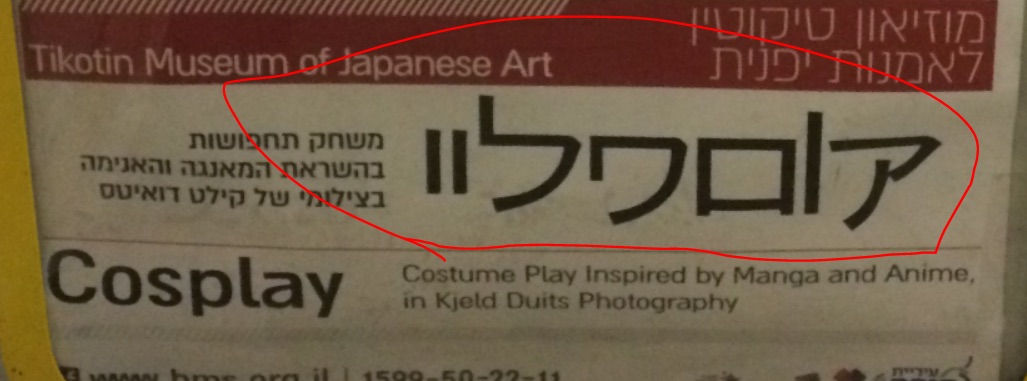Archive for Language play
Multiscriptal cosplay poster in Haifa
Guy Almog sent me this photograph of a detail from a poster that he and I spotted at several places in and around the Haifa subway:
Read the rest of this entry »
The hippo bottom of us
One of the most successful weekly essays I wrote in an early sixties college class on modern English poetry was about T. S. Eliot's "The Hippopotamus", the first two (out of nine) stanzas of which read thus:
THE BROAD-BACKED hippopotamus
Rests on his belly in the mud;
Although he seems so firm to us
He is merely flesh and blood.
Flesh and blood is weak and frail, 5
Susceptible to nervous shock;
While the True Church can never fail
For it is based upon a rock.
Read the rest of this entry »
Days of the week in Nagoya
In "Hybrid writing in East Village, New York" (9/1/16), we looked at the playful combination of a Chinese character with Roman letters in the name of a Korean-Japanese restaurant, 木hursday, and we expanded our field of vision to encompass the names of the days of the week in languages across Eurasia.
Now Nathan Hopson takes us to Nagoya, Japan, where he spotted this fascinating take on the days of the week at Uni Mall, one of Nagoya's underground malls radiating off from the railway station.
Read the rest of this entry »
Furigana-like glossing in Mandarin
On Language Log, we have often touched upon the use of furigana ruby to gloss kanji (Chinese characters) for various purposes, most recently in the comments to "Roman-letter Mandarin pronoun of indeterminate gender " (8/9/16).
Read the rest of this entry »
"Facial expressions" in text-dominant online conversation
Christina Xu has written "A Field Guide to China's Most Indispensible Meme" (Motherboard, 8/1/16). Her essay includes more than a dozen illustrations, the first of which is this one:
Read the rest of this entry »
Pop Japonesque nonsense?
[This is a guest post by Nathan Hopson]
Amazon's App Store for Android features a free daily app. The selection of a few days ago caught my eye not for the content of the app itself, but for the nonsensical (and incorrect) use of Japanese.
Read the rest of this entry »
Cat and mouse on the Chinese internet
Yesterday in the Washington Post, there was an enticing article by Anna Fifield: "These are the secret code words that let you criticize the Chinese government" (7/29/15).
Fifield states that she is drawing on "Decoding the Chinese Internet: A Glossary of Political Slang," by authors Perry Link and Xiao Qiang. Comment by Perry Link: "This is good work, and I am happy to have my name associated, but it is not my work. Ms Fifield somehow made a mistake."
Read the rest of this entry »
Lojban just got harder
Matt Treyvaud forwarded this from the Lojban mailing list:
"Lojban changes to hanzi writing system" (4/1/15)
Some people complained that although the spelling in Lojban is very easy to grasp the grammar is not. So the committee for the development of Lojban (BPFK) decided to fix this issue and to make the spelling hard as well. Especially for those people who are not familiar with hanzi (Chinese characters).
Read the rest of this entry »
"Imitation Game" codebreakers also played the palindrome game
Doc, note: I dissent. A fast never prevents a fatness. I diet on cod.
Is this the best palindrome ever created in English? Many think so. (I agree.) But did you know that it was made by the British mathematician Peter Hilton, while working alongside Alan Turing as an "Enigma" codebreaker during World War II? If you've seen The Imitation Game, you might remember Matthew Beard's portrayal of young Hilton. (The film embellishes his true story, giving him a brother serving on a Royal Navy ship targeted by the Germans.)
Even more amazingly, "Doc, note I dissent…" was actually the result of a palindrome competition held by the codebreakers at Bletchley Park (who, as the movie shows, were quite good at UK-style cryptic crosswords, too). The competition was, like the rest of the goings-on at Bletchley Park, shrouded in secrecy until relatively recently. Now for the first time, Mark Saltveit, editor of The Palindromist Magazine, tells the full story of the codebreakers' palindrome game. Read all about on Vocabulary.com here.
A record-setting pangrammatic window
A few months ago, I posted here (and on Slate's Lexicon Valley blog) about PangramTweets, a bot created by Jesse Sheidlower that combs Twitter for tweets that include all 26 letters of the alphabet. I mentioned that it would be interesting to see if PangramTweets turns up any particularly short "pangrammatic windows," i.e., pangrammatic strings in naturally occurring text. At the time, the shortest known example was 42 letters long, in a passage from Piers Anthony's Cube Route:
"We are all from Xanth," Cube said quickly. "Just visiting Phaze. We just want to find the dragon."
My post inspired Malcolm Rowe, a software engineer at Google, to set about finding short pangrammatic windows in an automated fashion, first on the Project Gutenberg corpus and then on the megacorpus of web pages indexed by Google. (Let's hear it for Google's 20 percent time!) On his blog, Malcolm now reports on his findings, including the discovery of a 36-letter pangrammatic window that appeared in a review of the movie Magnolia on PopMatters:
Further, fractal geometries are replicated on a human level in the production of certain “types” of subjectivity: for example, aging kid quiz show whiz Donnie Smith (William H. Macy) and up and coming kid quiz show whiz Stanley Spector (Jeremy Blackman) are connected (or, perhaps, being cloned) in ways they couldn’t possibly imagine.
Read the rest of this entry »
PangramTweets
The Twitter API, beyond its great utility for corpus linguistics (see "On the front lines of Twitter linguistics," "The he's and she's of Twitter"), has made possible a lot of fun automated text-mining projects. One fertile area is algorithmic found poetry: there have been Twitter bots designed to find accidental haikus, and even more impressively, a bot named @Pentametron that finds rhyming tweets in iambic pentameter and fashions sonnets out of them.
And then there is found wordplay, which is its own kind of found poetry. I'm a big fan of @Anagramatron, which discovers paired tweets that form serendipitous anagrams of each other. (Example: "Last time I do anything" ⇔ "That's it. I'm dying alone.") Now, courtesy of Jesse Sheidlower, comes @PangramTweets, in which each tweet contains every letter of the alphabet at least once.
Read the rest of this entry »




